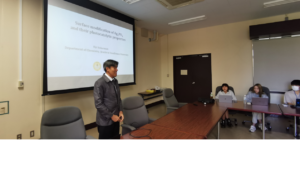Lecture Information
Time: 13:15-14:15, Oct.3rd, 2023
Place: 3F Seminar Room, F01 Minami Buld# 1, IMRAM, Tohoku University
https://www.tohoku.ac.jp/japanese/profile/campus/01/katahira/
Title: Surface modification of Ag3PO4 and their photocatalytic properties
Prof. Uyi Sulaeman
Department of Chemistry, Jenderal Soedirman University, Purwokerto 53123, Indonesia
Email: sulaeman@unsoed.ac.id
Ag3PO4 is a photocatalyst that is very active in visible light and is very promising for application in the degradation of organic pollutants. However, this photocatalyst still has problems, apart from the high recombination of electrons and holes, it also has low stability making it difficult to apply further. The ability of this photocatalytic activity is greatly influenced by the surface. Morphology, facets, and surface defects greatly influence its properties and activity. Therefore, here a photocatalyst surface modification has been carried out. The modification carried out was treatment with a solution of chloroplatinate chloride, lithium iodide (LiI), and alginate. Surface modification of Ag3PO4 using an anionic platinum complex has a significant effect. The technique used is very simple, namely, the Ag3PO4 sample is suspended in a chloroplatinate chloride solution by sonication. This technique results in changes in the surface properties of the photocatalyst. The platinum complex ion successfully replaced the phosphate in Ag3PO4 and increased the photocatalytic activity significantly. Another quite amazing approach is the modification of Ag3PO4 with LiI solution. This technique also brings quite significant changes in properties, the photocatalytic ability of Ag3PO4 increases very high. Based on XPS analysis, lithium and iodine can be incorporated into Ag3PO4. Surface mechanism analysis shows that the hole species plays an important role in enhancing photocatalytic activity. Surface modification of Ag3PO4 with alginate was also carried out using the chemisorption method. Based on XPS spectra analysis, alginate is strongly bound to the Ag3PO4 surface. The activity capability is high because the alginate-Ag3PO4 conjugate acts as an electron donor on the photocatalyst surface


